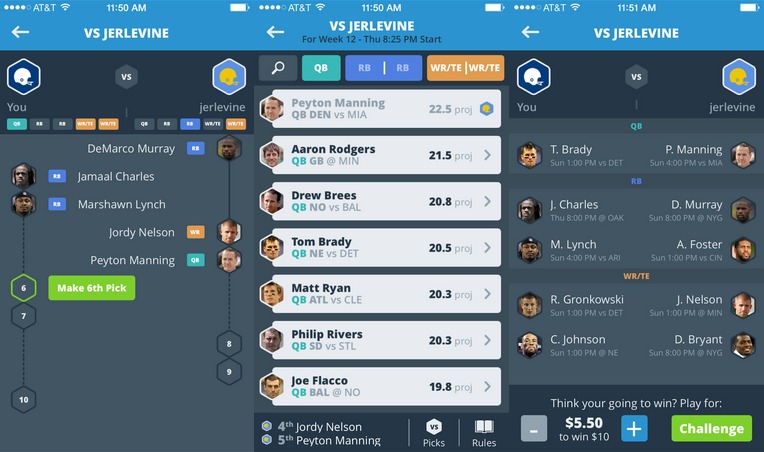It already seems like an eternity ago, but it was merely a year ago that DraftKings was not even the only daily fantasy site of its ilk in the Boston area. StarStreet, an equally aspirational startup, was making strides in the now-booming world of daily fantasy. Then, with a touch of surprise, DraftKings acquired StarStreet.com and its assets. The distinguishing fact in the deal was that StarStreet Inc. and its founder, Jeremy Levine, were left free to begin another project.
Levine, one of the original pioneers in the daily fantasy market to see its potential, disappeared briefly from the forefront of the news cycle. Just as his former competitors at DraftKings took off on the national stage in a string of high-profile contests (and a deluge of advertisements), Levine and his team began developing a new project: Draft.
In Draft, players on a mobile app do exactly as the name suggests: They draft teams that then compete against each other on a given night. It’s quick, simple and cuts to the most enjoyable part of fantasy (actually drafting).
“So obviously as we were running StarStreet we kind of got to know a lot about the industry, the challenges with it,” said Levine in a recent interview with BostInno. “The FanDuel/DraftKings model. As we were doing that, we always wanted to build a mobile experience.”
Levine expanded on that, offering his post-StarStreet thought process:
After we sold StarStreet, we knew immediately that this is what we wanted to build. We kind of saw two pieces of opportunity. One was around the fact that nobody had ever built a mobile game for fantasy before. And two was around the fact that kind of all existing fantasy games are pretty hardcore and time-consuming experiences, which kind of in turn made them definitively not mobile experiences. So you look at like Yahoo or ESPN, the season long fantasy. You’ve got to join a league. You’ve got to draft a team. You have to book a whole night for that, it takes like three or four hours. You need to manage a team over the course of a season. And right, that’s not the way we play mobile games. And you think about the massive market, there are a lot of sports fans who don’t play fantasy.
The particular notion of attracting non-fantasy sports fans was an enticing one for Levine. After all, having competed so heavily with DraftKings for the “hardcore” fantasy players, he surmised that not only would it be easier to achieve success doing something different, but that he might potentially have a wider audience base.
“If you ask any existing fantasy player why they don’t play daily fantasy, it’s always kind of ‘too much time, too hardcore, too much effort,'” Levine explained. “If you ask any of the 200 million sports fans who don’t play fantasy sports why they don’t, it’s a similar answer. So we really thought that we could build a truly simple mobile experience that would really attract that 250 million in what’s a way bigger, more casual market than what FanDuel or DraftKings or what we were going after with StarStreet.”
Theoretically, the hardest part for Levine and his former StarStreet team should’ve been identifying exactly how to appeal to the non-fantasy masses. But the Draft founders were a quick study in regards to that question.
“As we kind of realized that we wanted to go after this oppurtunity to build a mobile game, we spent a lot of time looking around at mobile games,” said Levine. “And we really kept seeing games that are not hardcore and not graphic-intensive that have been successful are really often turn-based games.”
Captivating games like Words With Friends or QuizUp stuck out. And it appealed to Levine’s favorite part of fantasy: the draft.
“As we got to thinking about it, we realized that a draft is a turn-based game,” Levine noted. “That’s exactly what it is. And that drafting is obviously everyone’s favorite part of fantasy sports. It’s the most fun part. So it became very obvious that that was what we should build.”
He’s used his StarStreet experience well since Draft officially launched in December of 2014. The company is already progressing faster in his eyes because of it.
“I definitely learned a lot in my five-plus years doing Starstreet. I take a lot of that learning here, both in what we’re building and how we’re doing it. The number one thing is that we’re able to move a lot faster.”

And despite the perpetual competition between Boston and New York, Levine’s move from The Hub to The Big Apple was rooted in fairly informal terms.
“Kind of a mix of things, but really I just personally wanted to be here,” Levine says about the switch to New York. “I’d been in Boston my whole life, actually, outside of college. And I just thought the time was right to make the move and start Draft here.”
He continues to invest heavily in Boston, keeping strong ties to his old home. Looking back on his time with StarStreet, Levine has no regrets, but acknowledges how events might have taken another direction.
“I mean there’s certainly a lot that I know now that, had I known five years ago when I started Starstreet, the outcome could’ve been a lot different I think,” Levine explained. “But definitely, in terms of the sale and how it happened and being able to immediately get working on Draft, I certainly wouldn’t change any of that. I mean everything’s gone very much according to plan as soon as we started Draft.”
As for some of the recent controversy that the daily fantasy world finds itself in now (particularly the legal challenges), Levine is adamant that FanDuel, DraftKing and the rest of the group will be just fine.
“Not at all,” Levine said in regards to if he sees daily fantasy on tenuous legal ground. “I think the legality is very clear and very clearly defined. DraftKings and FanDuel as kind of the market leaders do a great job making sure that they stay within the legality.”
Draft, as it stands currently, is still very early in its development. Nonetheless, Levine said he doesn’t believe that the current daily fantasy market leaders are destined to compete directly against him.
“To be honest I don’t see those guys as competitive to what we’re currently doing,” Levine noted. “Back with StarStreet, obviously we were direct competitors. And at the time we sold StarStreet we were number three to them (DraftKings), but they were far out ahead of us. And we were kind of very confident that there was a bigger opportunity in what we’re doing now with Draft than continuing to build StarStreet and that’s a large part of why we made that move.”
Levine’s goal, essentially, is to build a more harmless daily fantasy game that users can quickly grasp and play on their phones. Ultimately, Levine boiled down a Draft-DraftKings comparison in one sentence:
“The way we see it is we’re daily fantasy for everyone, where they’re daily fantasy for the hardcore.”
Image via Draft


